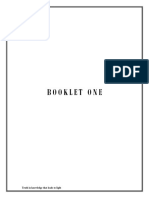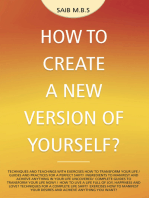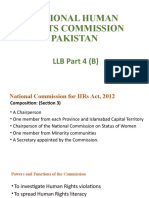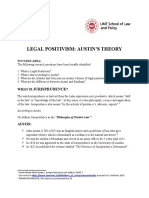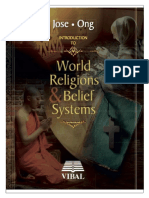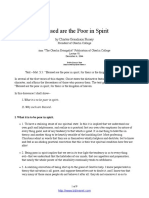0 ratings0% found this document useful (0 votes)
8 viewsChapter 1
Chapter 1
Uploaded by
Saad KhanCopyright:
© All Rights Reserved
Available Formats
Download as DOCX, PDF, TXT or read online from Scribd
Chapter 1
Chapter 1
Uploaded by
Saad Khan0 ratings0% found this document useful (0 votes)
8 views1 pageCopyright
© © All Rights Reserved
Available Formats
DOCX, PDF, TXT or read online from Scribd
Share this document
Did you find this document useful?
Is this content inappropriate?
Copyright:
© All Rights Reserved
Available Formats
Download as DOCX, PDF, TXT or read online from Scribd
Download as docx, pdf, or txt
0 ratings0% found this document useful (0 votes)
8 views1 pageChapter 1
Chapter 1
Uploaded by
Saad KhanCopyright:
© All Rights Reserved
Available Formats
Download as DOCX, PDF, TXT or read online from Scribd
Download as docx, pdf, or txt
You are on page 1of 1
Chapter 1: Introduction to Al-Tawhid 1.
1 Belief in the Existence of God Before believing in any of the
roots of religion, a believer should have strong faith in the existence of God. It is not enough to believe
in God because it is what most people do, or it is what has always been taught and believed by those
around us. Each human being has to know for himself/herself the reasons behind the belief in God. 1.2
Why should we know whether God exists? Before we learn about the ways of knowing that there is a
God, the first question we must answer is why should we even bother with that? Is it necessary to know
whether God exists or not? Would not life be much simpler if we did not ask this question in the first
place? To answer that, think of the following points. 1. Search for the Truth. It is a natural instinct to
search for truth. At some point in life, most people ask themselves basic questions such as how they
came upon the earth, who brought them here, what will be their ultimate end, etc. These questions
need answers, and cannot be ignored by suppression. Human beings, especially those who are curious
and intelligent, need to answer these questions in order to satisfy their search for the truth. 2. To thank
the Provider of Blessings. Good etiquette demands that we thank all those who carry out favors for us,
whether big or small. The more the favors, the more the appreciation and gratitude should be. Take an
example of a person who stays as a guest at someone's home. All preparations have been carried out to
meet his needs. He has a room ready for him, food on the table, clothes washed and dried, etc. Would
he not want to thank the person who did this for him? Good manners dictate that he should show his
gratitude at the favors received by him by thanking the host. If he does not know who the host is, he
should make an effort to find out. To ignore that, and just enjoy the benefits, would be considered ill
mannered and rude. When we come into the world, we see that there are a lot of blessings and favors
that have been prepared for us. We have a wonderful body, family, home, beautiful earth, trees, fruits,
flowers, animals, and numerous other blessings all of which are there for our use and benefit. Surely we
need to ask who these blessings came from, in order to thank the Provider. It would be most ungracious
if there really was a Provider and we did not bother to find out and thank Him. Grade 7 Fiqh 9 3. Basis
for Life. The way we live our lives is tremendously affected by whether we believe in a God or not. A
person who does not believe in God would base his life on material and worldly benefits only. He would
see no benefit in doing good deeds, as he would have no belief in the hereafter. The outlook on life for
such a person would be completely different from one who believes in a God, and consequently believes
in the life after this world. To be able to plan our life in the best and most fruitful way possible, we need
to first ask whether there is a God or not. Once we have answered the question, we can base our actions
accordingly. 4. Avoid possible harm. Whenever we are warned about something, we immediately take
heed and find out about the possibility of danger. For example, when there is a scare of a particular
disease in a country, and the doctors warn that many people may die of it, the people of that country at
once take heed. Most people would take necessary precautions after finding out if they were in danger
of falling sick from that disease. This is because it is inherent in the human being to save himself from
possible danger. Many Prophets have come to humankind to warn them about disbelief, and the
punishment awaiting those who reject faith in God. It is our duty, as people who have been warned, to
at least study these warnings, and find out if they are true or not. We have been warned of punishment
in the life hereafter, of Hell and the tortures awaiting the rejecters of faith. Common sense dictates that
we should pay heed to these warnings and ask questions about them. It would be foolish to ignore the
warnings, and then perhaps find out when it is too late, that they were actually true. This would bring
great harm upon us.
You might also like
- 10 Levels of Speaking in TonguesDocument3 pages10 Levels of Speaking in TonguesJohn Nzinahora96% (26)
- Interview Before DeliveranceDocument11 pagesInterview Before DeliverancemotmagicNo ratings yet
- The Role of Religion in EthicsDocument12 pagesThe Role of Religion in EthicsCedric Dimalapitan100% (2)
- September 2020 Rhapsody of Realities ColoredDocument80 pagesSeptember 2020 Rhapsody of Realities ColoredRhaine KaisiNo ratings yet
- Once Saved Always Saved?Document53 pagesOnce Saved Always Saved?Kingdom Worker Ministries0% (1)
- LOGICDocument6 pagesLOGICMae Ann BusicoNo ratings yet
- RE Revision Guide 2010Document8 pagesRE Revision Guide 2010SaiiffNo ratings yet
- Biblical Keys to Life: The Questions We Have and the Answers We NeedFrom EverandBiblical Keys to Life: The Questions We Have and the Answers We NeedNo ratings yet
- Week 2 PerdevDocument5 pagesWeek 2 PerdevjemimahmelodiasNo ratings yet
- How To Listen To GodDocument3 pagesHow To Listen To GodMike RyanNo ratings yet
- Who Among You Would Like This P100 Right Away? I Am Willing To Give This NowDocument2 pagesWho Among You Would Like This P100 Right Away? I Am Willing To Give This NowEj MontoyaNo ratings yet
- AssignmentDocument2 pagesAssignmentSage LingatongNo ratings yet
- Mcaers' Perception of GodDocument2 pagesMcaers' Perception of GodAnonymous eANyKc9pYNo ratings yet
- Weeekly Devotional #1: How Does God Talk To You?Document6 pagesWeeekly Devotional #1: How Does God Talk To You?Ivan ScottNo ratings yet
- Lost in Distortion: Keys to Keeping Your Spiritual Life Pure and SimpleFrom EverandLost in Distortion: Keys to Keeping Your Spiritual Life Pure and SimpleNo ratings yet
- Truth in Knowledge That Leads To Light Booklet OneDocument10 pagesTruth in Knowledge That Leads To Light Booklet Onemothereve35No ratings yet
- Bible ExamDocument2 pagesBible Examapi-506944224No ratings yet
- Virtue & The Pursuit of Happiness - Lesson OneDocument8 pagesVirtue & The Pursuit of Happiness - Lesson OneTerri ThomasNo ratings yet
- The True Purpose of LifeDocument59 pagesThe True Purpose of LifeYaqeen Ul Haq Ahmad SikanderNo ratings yet
- Encouraging The Truth Organization: The of The To TheDocument7 pagesEncouraging The Truth Organization: The of The To TheRocky ChristophersonNo ratings yet
- Healing: God's Gift of Mercy and GraceDocument33 pagesHealing: God's Gift of Mercy and GraceN. HansrajNo ratings yet
- The Wiersbe Bible Study Series: 2 Peter, 2&3 John, Jude: Beware of the Religious ImpostersFrom EverandThe Wiersbe Bible Study Series: 2 Peter, 2&3 John, Jude: Beware of the Religious ImpostersRating: 5 out of 5 stars5/5 (2)
- Prerequisites For Spiritual Ministry: Leading God's people, #16From EverandPrerequisites For Spiritual Ministry: Leading God's people, #16No ratings yet
- Reflection Paper PDFDocument2 pagesReflection Paper PDFRocejane MandadoNo ratings yet
- Islam Is PurityDocument68 pagesIslam Is Puritymahmoud asarNo ratings yet
- Living Right Side Up in An Upside Down SocietyDocument4 pagesLiving Right Side Up in An Upside Down SocietyJeanne May Marcos SantosNo ratings yet
- Proving Heaven 2.0: Fix and Upgrade Broken Faith Through a Deep Understanding of the Real Heaven!From EverandProving Heaven 2.0: Fix and Upgrade Broken Faith Through a Deep Understanding of the Real Heaven!No ratings yet
- Love Is Something WonderfulDocument3 pagesLove Is Something WonderfulVinabie PunoNo ratings yet
- A Matter of TrustDocument6 pagesA Matter of TrustMelorie MutiaNo ratings yet
- Juaño - CWTS (Good Citizenship Values)Document5 pagesJuaño - CWTS (Good Citizenship Values)Juaño, Alexa LenNo ratings yet
- Mind, Body, Spirit And Discovering the Purpose of lifeFrom EverandMind, Body, Spirit And Discovering the Purpose of lifeNo ratings yet
- Marriage Personnal LawDocument17 pagesMarriage Personnal LawSaad KhanNo ratings yet
- Pakistan HR Legal FrameworkDocument22 pagesPakistan HR Legal FrameworkSaad KhanNo ratings yet
- General Exceptions + Right of Private DefenceDocument7 pagesGeneral Exceptions + Right of Private DefenceSaad Khan100% (1)
- Abetment + Criminal ConspiracyDocument7 pagesAbetment + Criminal ConspiracySaad KhanNo ratings yet
- Marshalling, Contribution, Subrogation, Tacking and Prohibition of TackingDocument6 pagesMarshalling, Contribution, Subrogation, Tacking and Prohibition of TackingSaad KhanNo ratings yet
- Legal Positivism Austins TheoryDocument6 pagesLegal Positivism Austins TheorySaad KhanNo ratings yet
- Rights and Liabilities of MortgagerDocument6 pagesRights and Liabilities of MortgagerSaad KhanNo ratings yet
- Gift (Transfer of Property Act) : DefinitionDocument5 pagesGift (Transfer of Property Act) : DefinitionSaad KhanNo ratings yet
- Notes in Question and Answer Forms On PADocument12 pagesNotes in Question and Answer Forms On PASaad KhanNo ratings yet
- WorksheetDocument1 pageWorksheetSaad KhanNo ratings yet
- A QuestionDocument1 pageA QuestionSaad KhanNo ratings yet
- Diagram of Early ScholarsDocument2 pagesDiagram of Early ScholarsSaad KhanNo ratings yet
- William Thomson, 1St Baron Kelvin: Jump To Navigationjump To SearchDocument5 pagesWilliam Thomson, 1St Baron Kelvin: Jump To Navigationjump To SearchSaad KhanNo ratings yet
- Components: Principles of Islamic JurisprudenceDocument2 pagesComponents: Principles of Islamic JurisprudenceSaad KhanNo ratings yet
- Relation To Kinetic TheoryDocument2 pagesRelation To Kinetic TheorySaad KhanNo ratings yet
- Microsoft Dynamics 365Document2 pagesMicrosoft Dynamics 365Saad KhanNo ratings yet
- Gas Laws: Pressure Temperature Gas Boyle's Law Robert Boyle Charles's LawDocument3 pagesGas Laws: Pressure Temperature Gas Boyle's Law Robert Boyle Charles's LawSaad KhanNo ratings yet
- Human Rights Commission of PakistanDocument3 pagesHuman Rights Commission of PakistanSaad KhanNo ratings yet
- Religious Discrimination in PakistanDocument2 pagesReligious Discrimination in PakistanSaad KhanNo ratings yet
- Charles's Law: Jump To Navigation Jump To SearchDocument3 pagesCharles's Law: Jump To Navigation Jump To SearchSaad KhanNo ratings yet
- Kinetic Theory of GasesDocument3 pagesKinetic Theory of GasesSaad KhanNo ratings yet
- How To Check For Uplift PressureDocument3 pagesHow To Check For Uplift PressureSaad Khan100% (1)
- Engaging The Thought of Bernard Lonergan Written by Louis Roy PDFDocument2 pagesEngaging The Thought of Bernard Lonergan Written by Louis Roy PDFSathish VidyutNo ratings yet
- World of Ideas QuizDocument3 pagesWorld of Ideas QuizNikka GoenettNo ratings yet
- 08 The Five-Fold Ministry PDFDocument48 pages08 The Five-Fold Ministry PDFKumah WisdomNo ratings yet
- Modiphius - Dune - Adventures in The Imperium - Quickstart - Adventure - Desertfall (CLOSED BETA TEST) (2020) PDFDocument62 pagesModiphius - Dune - Adventures in The Imperium - Quickstart - Adventure - Desertfall (CLOSED BETA TEST) (2020) PDFsothNo ratings yet
- Edith Stein: John Sullivan, OcdDocument164 pagesEdith Stein: John Sullivan, Ocdgreat mcginty100% (1)
- Philippine Normal University: College of Flexible Learning and ePNUDocument5 pagesPhilippine Normal University: College of Flexible Learning and ePNUIsaac DeleonNo ratings yet
- Sango, Guillermo V.C. Bsit It201 Philosophy Professor: Jumel G. EstrañeroDocument5 pagesSango, Guillermo V.C. Bsit It201 Philosophy Professor: Jumel G. EstrañeroGuill SangoNo ratings yet
- Faith and Works by Charles PriceDocument3 pagesFaith and Works by Charles PriceNgwenyaNo ratings yet
- Allahumma-Inni - Ala - Zikr-Ika - Wa Shuk-Rika Wa Husni-Ibad-AtikaDocument9 pagesAllahumma-Inni - Ala - Zikr-Ika - Wa Shuk-Rika Wa Husni-Ibad-AtikariswanNo ratings yet
- GenesisDocument50 pagesGenesisNamrud TekleNo ratings yet
- Laudato Si Group 2 ScriptDocument9 pagesLaudato Si Group 2 ScriptCel DelabahanNo ratings yet
- World ReligionDocument9 pagesWorld ReligionRodelyn Ramos GonzalesNo ratings yet
- Super Christ PrintDocument104 pagesSuper Christ PrintChristian CassarlyNo ratings yet
- Organziation As A SystemDocument12 pagesOrganziation As A SystemisaacpapicaNo ratings yet
- 5 6 Religion Unit of Jesus Message of LoveDocument5 pages5 6 Religion Unit of Jesus Message of Loveapi-525404544No ratings yet
- 06/05/2024 Morning Murli Om Shanti Bapdada Madhuban Essence: Question: What One Concern Should You Have in Order To Become God'S Helpers? AnswerDocument3 pages06/05/2024 Morning Murli Om Shanti Bapdada Madhuban Essence: Question: What One Concern Should You Have in Order To Become God'S Helpers? Answermayra mayraNo ratings yet
- Sermon Notes & Small Group QuestionsDocument4 pagesSermon Notes & Small Group QuestionsBui BinhNo ratings yet
- Costofdiscipleship Bonhoeffer Peterhorne PDFDocument15 pagesCostofdiscipleship Bonhoeffer Peterhorne PDFHerman Cruz100% (1)
- Anthony Bloom - God and Man-Newman Press (1971)Document136 pagesAnthony Bloom - God and Man-Newman Press (1971)Nikoloz Kopaleishvili100% (1)
- Christianity ProtestantismDocument4 pagesChristianity ProtestantismBobby Jin OliverosNo ratings yet
- We Celebrate God's Love Gr. 7 (TM) PDFDocument91 pagesWe Celebrate God's Love Gr. 7 (TM) PDFChRry ChAi Abrenica100% (5)
- Wasteland by EliotDocument11 pagesWasteland by EliotSyed Muhammad AamirNo ratings yet
- Best Practices in Adolescent Faith FormationDocument10 pagesBest Practices in Adolescent Faith FormationKristine Dahang MabalosNo ratings yet
- Charles Finney Blessed Are The Poor in Spirit PDFDocument9 pagesCharles Finney Blessed Are The Poor in Spirit PDFOO;No ratings yet
- Big Story Gospel Presentation OutlineDocument6 pagesBig Story Gospel Presentation OutlineAdrian Neil PabloNo ratings yet
- A Detailed Lesson Plan For Grade 7Document7 pagesA Detailed Lesson Plan For Grade 7Norbelle LouNo ratings yet
- DfsdfdfsDocument5 pagesDfsdfdfsjNo ratings yet






























